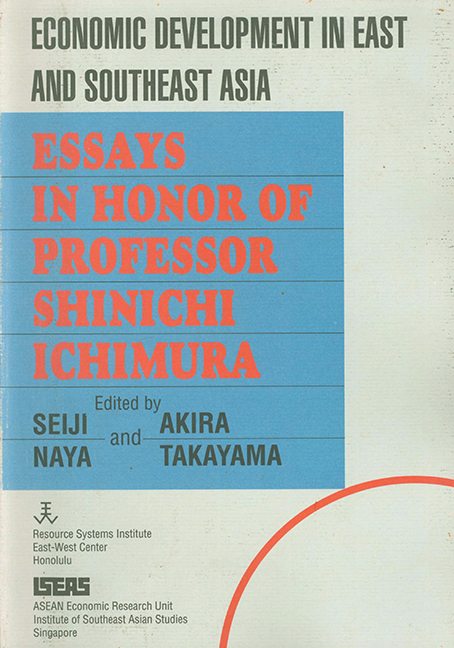Book contents
- Frontmatter
- Preface
- Shinichi Ichimura, 1925-
- CONTENTS
- Introduction
- Contributors to This Volume
- I Structural Change and Economic Development in Developing Asia in the 1990s
- II Explaining the Success of the Four Little Dragons: A Survey
- III Taiwan's Economic Miracle: A Singaporean Perspective
- IV Singapore's Experience of Industrial Restructuring: Lessons for the Other Asian NIEs
- V Korean Industrial Policies for Declining Industries
- VI Vietnam: Recent Economic Developments and the World Economy
- VII Transition from Import Substitution to Export Expansion: The Thai Experience
- VIII Adjustment Problems of a Small Oil-Exporting Country: Did Indonesia Suffer from the Dutch Disease?
- IX A Quarterly Econometric Model of the Hong Kong Economy
- X The Effect ofRicardian Rent Extracting on Macroeconomic Performance
- XI Direct Foreign Investment and the Economic Development of Korea
- XII Japanese Investment in Thailand: Looking Back and Into the Future
- XIII The Effects of Direct Foreign Investment on Taiwan: A Macroeconometric Investigation
- XIV A Reform of the Foward Foreign Exchange Market and Foreign Exchange Rate Determination Policy in Korea, with Foreign Exchange Policy Experiences of Taiwan
- XV Interest Rate and Foreign Exchange Liberalization in Taiwan in the 1980
- XVI Manifold Dilemmas behind External Debt Management
- XVII Agricultural Growth and Food Imports in Developing Countries: A Reexamination
- XVIII The Transformation of Rural Asia and Economic Development Theory and Policy
- XIX The ASEAN Summit and ASEAN Economic Cooperation
- XX The Role of Developing Countries in the New GATT Round
- XXI The Emerging Global Economy and the Role of the Asian NIEs
- Index
V - Korean Industrial Policies for Declining Industries
Published online by Cambridge University Press: 21 October 2015
- Frontmatter
- Preface
- Shinichi Ichimura, 1925-
- CONTENTS
- Introduction
- Contributors to This Volume
- I Structural Change and Economic Development in Developing Asia in the 1990s
- II Explaining the Success of the Four Little Dragons: A Survey
- III Taiwan's Economic Miracle: A Singaporean Perspective
- IV Singapore's Experience of Industrial Restructuring: Lessons for the Other Asian NIEs
- V Korean Industrial Policies for Declining Industries
- VI Vietnam: Recent Economic Developments and the World Economy
- VII Transition from Import Substitution to Export Expansion: The Thai Experience
- VIII Adjustment Problems of a Small Oil-Exporting Country: Did Indonesia Suffer from the Dutch Disease?
- IX A Quarterly Econometric Model of the Hong Kong Economy
- X The Effect ofRicardian Rent Extracting on Macroeconomic Performance
- XI Direct Foreign Investment and the Economic Development of Korea
- XII Japanese Investment in Thailand: Looking Back and Into the Future
- XIII The Effects of Direct Foreign Investment on Taiwan: A Macroeconometric Investigation
- XIV A Reform of the Foward Foreign Exchange Market and Foreign Exchange Rate Determination Policy in Korea, with Foreign Exchange Policy Experiences of Taiwan
- XV Interest Rate and Foreign Exchange Liberalization in Taiwan in the 1980
- XVI Manifold Dilemmas behind External Debt Management
- XVII Agricultural Growth and Food Imports in Developing Countries: A Reexamination
- XVIII The Transformation of Rural Asia and Economic Development Theory and Policy
- XIX The ASEAN Summit and ASEAN Economic Cooperation
- XX The Role of Developing Countries in the New GATT Round
- XXI The Emerging Global Economy and the Role of the Asian NIEs
- Index
Summary
Introduction
A country's industrial structure changes continuously with the environment within which each industry survives. Changes in the social, economic, and cultural conditions will influence industrial structure. Sometimes a country's industrial structure is formed autonomously and at other times on the basis of policy guidance. Some forces that shape the various conditions of each industry include: (1) The domestic and international demand, which reflects the national needs, the market conditions, and the country's relations with the international economy; (2) The conditions of production factors, including labor, capital, natural resources, etc.; (3) The level of technology or the input structure; (4) The emergence of substitute products; and (5) The competition among incumbents and the threat of new entrants.
The dynamic changes in the conditions require each industry to adjust properly. Influenced by these forces, new industries are born, earn above-average returns on investment, and absorb more labor; at the same time, once-prosperous industries decline and thousands of workers are laid off. The transformation of a nation's industrial structure stimulates its economic development and determines the nature of the economy. The adjustment process, however, brings social conflicts and costs, especially when it benefits one sector of the society at the expense of others.
Especially in newly industrializing economies (NIEs) like Korea, the emergence of declining industries may be an unwelcome effect of rapid growth. However, declining industries are to be expected as changes in the environment — i.e., increases in real wages — take place. Tb date, most of the adjustment in Korea has taken place with relatively little direct government involvement as rapid growth created new job opportunities and absorbed those who were out of work in declining industries.
However, in the mid-1980s, Korea appeared to be approaching a new stage of economic development. It is a fundamental principle that the optimum reallocation of resources in an economy be pursued through the market mechanism. However, when rational decision making by the private sector cannot achieve the optimal solution, government industrial policy towards declining industries can be very significant. For declining industries, the Korean government is confronted with a dilemma of two conflicting policies — withdrawal or addition of resources.
In some declining industries, government policy is needed to aid the withdrawal of resources. Government intervention can be vital in the presence of market imperfections, particularly exit barriers, economies of scale, externalities, and the incentive-distorting effects of government policies.
- Type
- Chapter
- Information
- Economic Development in East and Southeast AsiaEssays in Honor of Professor Shinichi Ichimura, pp. 72 - 93Publisher: ISEAS–Yusof Ishak InstitutePrint publication year: 1990



